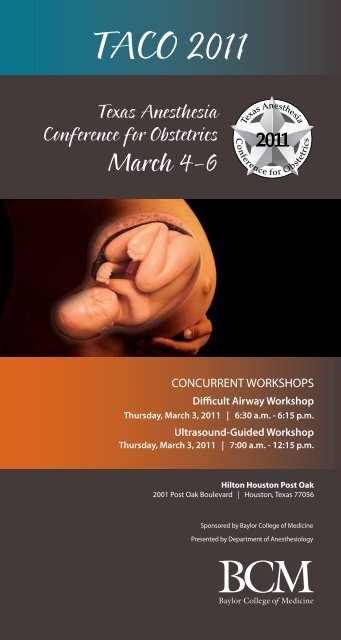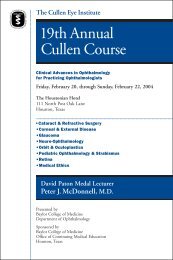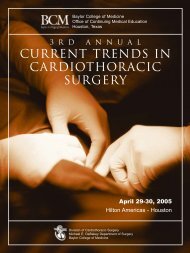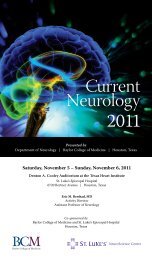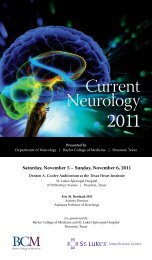Texas Anesthesia Conference For Obstetrics T - CME Activities
Texas Anesthesia Conference For Obstetrics T - CME Activities
Texas Anesthesia Conference For Obstetrics T - CME Activities
- No tags were found...
Create successful ePaper yourself
Turn your PDF publications into a flip-book with our unique Google optimized e-Paper software.
<strong>Texas</strong> <strong>Anesthesia</strong><strong>Conference</strong> for <strong>Obstetrics</strong>March 4-6<strong>Texas</strong> <strong>Anesthesia</strong><strong>Conference</strong> for <strong>Obstetrics</strong>CONCURRENT WORKSHOPSDifficult Airway WorkshopThursday, March 3, 2011 | 6:30 a.m. - 6:15 p.m.Ultrasound-Guided WorkshopThursday, March 3, 2011 | 7:00 a.m. - 12:15 p.m.Hilton Houston Post Oak2001 Post Oak Boulevard | Houston, <strong>Texas</strong> 77056Sponsored by Baylor College of MedicinePresented by Department of Anesthesiology
TACO 2011Difficult Airway WorkshopActivity DirectorsActivity Co-DirectorsActivity ManagersMaya S. Suresh, MD, and Ashutosh Wali, MD, FFARCSIUma Munnur, MDDavid Madrigal, MHA, C<strong>CME</strong>P and Annette BrienoNeeds and Target AudienceDepartment of Anesthesiology, Baylor College of Medicine developed the Difficult AirwayWorkshop to educate, highlight, and teach various concepts and new devices in difficult airwaymanagement.The planning committee reviewed comments and surveys from previous workshop participantswho indicated the value of the workshop. The committee also reviewed recent national scientificevidence and peer-reviewed articles to determine the need for increased education and hands-ontraining in the management of pediatric and adult difficult airways.Sources demonstrating the need for improved performance in the management of thedifficult airway (DA) include the American Society of Anesthesiologists (ASA), Obstetric<strong>Anesthesia</strong> Closed Claims Project Database, and standardized collection of case summariesfrom professional liability insurance companies closed claims files. National and internationalanesthesiologists, and emergency medicine physician experts in airway management willprovide practical tips and updates during the course and in the interactive group sessions at theworkshop.Anesthesiologists, Certified Registered Nurse Anesthetists (CRNAs), emergency medicinephysicians, and other allied health professionals assisting with airway management shouldattend.Educational Methods and ObjectivesThrough the use of lectures, case presentations, panel discussion, a syllabus and hands-onworkshop sessions, the participant should be able to:• Describe factors that predispose patients to difficult intubation and/or ventilation.• Discuss preoperative assessment methods to identify patients difficult to intubate.• Discuss the use of airway devices in the various steps of the ASA Difficult Airway Algorithmin appropriate clinical situations.• Discuss the new airway devices and methods to help manage difficult airways.• Describe and discuss the features, advantages, limitations, and applications of newsupraglottic ventilatory devices available for difficult airway management.EvaluationEvaluation by questionnaire will address program content, presentation, and possible bias.Accreditation/Credit DesignationBaylor College of Medicine is accredited by the Accreditation Council for Continuing MedicalEducation to provide continuing medicaleducation for physicians.Baylor College of Medicine designates thiseducational activity for a maximum of5.50 AMA PRA Category 1 Credits.Physicians should only claim creditcommensurate with the extent oftheir participation in the activity.The ‘hands-on’ sessions of thisactivity are not designated and/oreligible for <strong>CME</strong> credit.
thursday, March 3, 20116:30 AM Registration and Continental Breakfast7:00 Welcome and IntroductionMaya S. Suresh, MDChairman Department of AnesthesiologyProfessor of Anesthesiology and <strong>Obstetrics</strong> and GynecologyDivision Chief of <strong>Obstetrics</strong> and Gynecology AnesthesiologyASA Algorithm, Preoxygenation, and Difficult LaryngoscopyModerator: Ashutosh Wali, MD, FFARCSI7:05 Pre-operative Assessment and Prediction of Difficult AirwayAlice Oswald, MD7:30 ASA Difficult Airway Algorithm Preview and ReviewMaya S. Suresh, MD7:55 Difficult Laryngoscopy: Role of VideolaryngoscopeCarin A. Hagberg, MD8:15 BreakDifficult Mask Ventilation and Extubation StrategiesModerator: Maya S. Suresh, MD8:25 Strategies for Optimizing PreoxygenationChris Christodoulou, MD8:50 Difficult Mask VentilationCarin A. Hagberg, MD9:15 Laryngeal Mask Airway: Special ConsiderationsChandy Verghese, MD9:40 Extubation and Airway Exchange CathetersThomas C. Mort, MD10:05 Break10:20 “HANDS-ON” WORKSHOP: MORNING SESSION*Moderators: Ashutosh Wali, MD, FFARCSI, Maya S. Suresh, MD, and Uma Munnur, MD• Preparation of the Airway• Eschmann Stylet• Flexible Scopes- Adult and Pediatric- Double Lumen Tube- Bronchial Blockers• Optical Stylets- Levitan Scope- Shikani Stylet- Video Intubation Scope11:50 Lunch (provided)New Devices in Airway ManagementModerator: Uma Munnur, MD1:00 New Gadgets in Airway ManagementAshutosh Wali, MD, FFARCSI1:25 CricothyroidotomyDave Nanan, MD1:50 Break• Videolaryngoscopes- GlideScope- McGrath VideoLaryngoscope- C-MAC- Air Traq- Pentax- King VisionUnique Challenges: Emergency Room, Pediatrics, Invasive Airway Access,and Airway RegistryModerator: Ashutosh Wali, MD, FFARCSI2:05 Pre-hospital and Emergency Room: Special ConsiderationsRichard V. Aghababian, MD2:35 The Pediatric Airway: Special ConsiderationsLaura Torres, MD3:00 The Traumatized Airway: ManagementSally Raty, MD3:25 Follow-up of the Difficult Airway Patient: Difficult Airway RegistryLorraine Foley, MD3:50 Panel Discussion4:15 Break4:30 “HANDS-ON” WORKSHOP: AFTERNOON SESSION*(Groups A & B will reverse assignments from morning session)6:00 Evaluation6:15 Adjourn*The ‘hands-on’ sessions of this activity are not designated and/or eligible for <strong>CME</strong> credit.• Supraglottic Airways- Laryngeal Mask Airway- Air Q- I-Gel• Combitube and Easy Tube• King LT/LTS• Jet Ventilation• Retrograde Wire Intubation• Pig Trachs/Mannekin- Cricothyroidotomy
TACO 2011Ultrasound -Guided WorkshopActivity DirectorActivity Co-DirectorsActivity ManagersMaya S. Suresh, MDConnie K. Tran, MD, and Jaime Ortiz, MDDavid Madrigal, MHA, C<strong>CME</strong>P and Annette BrienoNeeds and Target AudienceDepartment of Anesthesiology, Baylor College of Medicine developed the Ultrasound-GuidedWorkshop to educate, highlight and teach various concepts of ultrasound guidance placement ofneuraxial blocks and central venous lines.The planning committee reviewed the current survey to indicate the value of the workshop. Thecommittee also reviewed recent national scientific evidence and peer-reviewed articles to determinethe need for increased education and hands-on training in ultrasound-guided techniques.Sources demonstrated the need for improved performance in enhancing the success rate ofregional blocks and central line placement and to reduce the risks of complications. Experts inultrasound-guided techniques will provide practical tips and updates during the workshop andin the interactive group sessions at the workshop.Anesthesiologists, Certified Registered Nurse Anesthetists (CRNAs), and other allied healthprofessionals should attend.Educational Methods and ObjectivesThrough the use of lectures, presentations, a syllabus, and hands-on workshop sessions, theparticipant should be able to:• Describe the use of ultrasound to identify epidural and spinal anatomy.• Describe the application of ultrasound-guided techniques in regional anesthesia.• Describe the use of ultrasound as a tool for the placement of central line, peripheralintravascular and arterial lines.EvaluationEvaluation by questionnaire will address program content, presentation, and possible bias.Accreditation/Credit DesignationBaylor College of Medicine is accredited by the Accreditation Council for Continuing MedicalEducation to provide continuing medical education for physicians.Baylor College of Medicine designates this educational activity for a maximum of 3.0 AMA PRACategory 1 Credits. Physicians should only claim credit commensurate with the extent of theirparticipation in the activity.The ‘hands-on’ session of this activity is not designated and/or eligible for <strong>CME</strong> credit.
thursday, March 3, 20117:00 AM Registration and Continental Breakfast7:20 Welcome and IntroductionMaya S. Suresh, MD and Connie K. Tran, MDReview of Ultrasound and Clinical Applications of Ultrasound-Guided TechniquesModerator: Connie K. Tran, MD and Jaime Ortiz, MD7:40 Ultrasound Principles: Physics and Basic Applications of UltrasoundJaime Ortiz, MD8:15 The Use of Ultrasound in Neuraxial PlacementManuel Vallejo, MD8:45 Transversus Abdominis Plane (TAP) Block versus Epidural Blockfor Postoperative Pain Control after Cesarean SectionNeil Bailard, MD9:15 Ultrasound-Guided Vascular AccessRaja Palvadi, MD9:45 Update on Local Anesthetic ToxicityConnie K. Tran, MD10:15 Break10:30 “Hands-On” Workshop SESSION*Moderators: Connie K. Tran, MD, Jaime Ortiz, MD, Raja Palvadi, MD, Manuel Vallejo, MDand Neil Bailard, MDBasics of Ultrasound: Ultrasound-Guided Needle VisualizationGel Model, Tofu ModelPractical Applications (Human Model)Ultrasound-Assisted Neuraxial Techniques (Spinal, Epidural)Ultrasound-Guided Transversus Abdominis Plane (TAP) BlockThoraco-Abdominal Block (Human Model)Paravertebral BlockUltrasound-Guided Vascular AccessCentral Line Placement, Arterial Line Placement, Peripheral Line Placement12:00 Evaluation12:15 Adjourn*The ‘hands-on’ session of this activity is not designated and/or eligible for <strong>CME</strong> credit.
<strong>Texas</strong> <strong>Anesthesia</strong> <strong>Conference</strong>for <strong>Obstetrics</strong>Activity DirectorActivity Co-DirectorActivity ManagersMaya S. Suresh, MDQuisqueya T. Palacios, MDDavid Madrigal, MHA, C<strong>CME</strong>P and Annette BrienoNeeds and Target AudienceDepartment of Anesthesiology, Baylor College of Medicine developed the <strong>Texas</strong> <strong>Anesthesia</strong><strong>Conference</strong> in <strong>Obstetrics</strong> (TACO) 2011 based on the 2010 TACO <strong>Conference</strong> evaluations andsurveys of previous participants, the 2009 and 2010 In-Training Examinations and MOCAKeywords. The content was also based on national society and scientific meetings andpeer-reviewed publications.The conference will highlight the relevancy of the Practice Guidelines in Obstetric <strong>Anesthesia</strong>,tips to optimize epidural labor analgesia, the use of ultrasound in labor epidural placement andachieving competency.The conference will also focus on the “growing epidemic” of obesity and practical tips from2009–2010 literature. The conference will also address recent issues affecting the provision ofanesthesia in light of shortages of key anesthetic agents, and the changing views of vaginal birthafter Cesarean Section and JCAHO alert on maternal mortality. The conference will providenew ideas on crisis management and Rapid Response teams in management of critical situationsin obstetrics, an update on Closed Claims in obstetrics, and disclosure of adverse events andpreparing for Trial and Deposition.Anesthesiologists and Certified Registered Nurse Anesthetists (CRNAs) should attend.Educational Methods and ObjectivesThrough the use of lectures, case presentations, panel discussions, and question and answersessions, the participant should be able to:• Describe the role of ultrasound for spine demarcation before placement of neuraxial blocks.• Explain the American Society of Anesthesiologists updated practice guidelines for theprevention, detection, and management of respiratory depression associated with neuraxialopioid administration.• Employ lessons learned from the ASA Closed Claims Database Project regarding obstetricanesthesia mishaps to improve patient safety and decrease provider malpractice.• Describe and discuss the determinants and factors associated with failed intubation andmanagement strategies in obstetric patients.• Explain the American Society of Anesthesiologists obstetric anesthesia practice guidelinesregarding fasting regimens in pregnant women factoring in the individual patient and otherresearch studies.EvaluationEvaluation by questionnaire will address program content, presentation, and possible bias.Accreditation/Credit DesignationBaylor College of Medicine is accredited by the Accreditation Council for Continuing MedicalEducation to provide continuing medical education for physicians.Baylor College of Medicine designates this educational activity for a maximum of 24.5 AMAPRA Category 1 Credits. Physicians should only claim credit commensurate with the extent oftheir participation in the activity.The presentation, Full Disclosure of Adverse Events to Patients, has been designated by BaylorCollege of Medicine for .50 credit of education in medical ethics and/or professionalresponsibility.The presentation, Preparing for Trial and Deposition (Right versus Wrong Answer), has beendesignated by Baylor College of Medicine for .75 credit of education in medial ethics and/orprofessional responsibility.
friday, March 4, 20116:00 AM Registration and Continental Breakfast6:55 Welcome and IntroductionMaya S. Suresh, MDChairman Department of AnesthesiologyProfessor of Anesthesiology and <strong>Obstetrics</strong> and GynecologyDivision Chief of <strong>Obstetrics</strong> and Gynecology AnesthesiologyPractice Guidelines: Labor Analgesia Techniques—Old and New ThoughtsModerator: Maya S. Suresh, MD7:05 2006 ASA Practice Guidelines for Obstetric <strong>Anesthesia</strong>: Still Relevant?Lawrence C. Tsen, MD7:35 Loss of Resistance Technique: Air vs Saline—Old or New Debate?Scott Segal, MD7:55 Ultrasound for Labor Epidural Analgesia: When is Competency Reached?Manuel Vallejo, MD8:30 Epidural Equinox: Ten Tips to Optimize Your Epidural Labor Analgesia TechniqueLawrence C. Tsen, MD9:00 Is Combined-Spinal Epidural Analgesia Indicated for All Laboring Patients?Scott Segal, MD9:30 BreakNo Drugs/New Dilemmas/Old Drugs/Blocks RevisitedModerator: Chawla La Toya Mason, MD9:50 Drug Shortages: No Pentothal, Propofol, Succinylcholine, Fentanyl,or Morphine—Stat Section, Now What?Connie K. Tran, MD10:10 Ketamine for Instrumental Vaginal Delivery, Intra and PostpartumPain ManagementJose M. Rivers, MD10:40 Optimizing Oxytocin Use for Cesarean DeliveryLawrence C. Tsen, MD11:10 Transversus Abdominis Plane (TAP) Block for Post-Cesarean Delivery AnalgesiaManuel Vallejo, MD11:30 Panel Discussion12:00 BreakHOSTED LUNCHEON: Chronic Pain After Cesarean Delivery—Myth Or Real?Moderator: Maya S. Suresh, MD12:20 Introduction of Keynote Speaker12:30 Chronic Pain After Cesarean Delivery—New Thoughts and ResearchRuth Landau, MD1:30 Question and Answer SessionIntake During Labor, Infection, VBAC, Uterine RuptureModerator: Jose Rivers, MD2:15 Would You Like Fries with That? An Update on PO Intake During LaborJill M. Mhyre, MD2:45 Practice Advisory for the Prevention, Diagnosis and Management of InfectiousComplications Associated with Neuraxial TechniquesBarbara Leighton, MD3:15 What’s New in Obstetric <strong>Anesthesia</strong>? Practical Tips from the 2009-2010 LiteratureJill M. Mhyre, MD3:45 Break4:00 Changing Views on Vaginal Birth After Cesarean Delivery (VBAC)Christina M. Davidson, MD4:30 Recognition of Uterine Rupture and <strong>Anesthesia</strong> for VBACChawla LaToya Mason, MD5:00 Panel Discussion5:30 Adjourn
6:30 AM Registration/Buffet BreakfastSaturday, March 5, 2011The High-Risk Parturient, Morbid Obesity Reproductive TechnologiesModerator: Maya S. Suresh, MD7:00 New Trends in the Management of the High Risk ParturientJ. Sudharma Ranasinghe, MD7:30 The Growing Epidemic of Morbid ObesityManuel Vallejo, MD8:00 <strong>Anesthesia</strong> for Assisted Reproductive TechnologiesLawrence C. Tsen, MD8:30 Panel Discussion8:50 BreakPatient Safety: Improving OutcomesModerator: Alice Oswald, MD9:10 Declining Use of GA in <strong>Obstetrics</strong>: Maintaining Advanced Airway SkillsMaya S. Suresh, MD9:40 Dilemmas: Private Practice Versus Academic PracticeQuisqueya T. Palacios, MD10:00 <strong>Anesthesia</strong>-Related Maternal Mortality: Improving OutcomesJill M. Mhyre, MD10:30 Maternal Resuscitation: Early Warning Systems, Rapid Response,Team and ProtocolsUma Munnur, MD11:00 Break/Exhibits11:15 The ABCs of Postpartum Hemorrhage: ManagementManuel Vallejo, MD11:45 WHO and JCAHO Alert: Reducing Maternal Morbidity MortalitySecondary to Postpartum HemorrhageJose M. Rivers, MD12:15 Panel Discussion12:45 Lunch (on your own)Quality Assurance Team Training, GA Fetal NeurotoxicityModerator: Quisqueya T. Palacious, MD1:45 Should We Introduce Surgical Safety Checklist in <strong>Obstetrics</strong>to Reduce Morbidity and Mortality?Alice Oswald, MD2:15 Active Components of Effective Training in Obstetric EmergenciesShobana Chandrasekhar, MD2:45 Code in OB Suite: Update on Crisis Resource ManagementJill M. Mhyre, MD3:15 Break/Exhibits3:30 Taps and Mishaps: The Catheter That MisbehavedSloan Youngblood, MD4:00 General <strong>Anesthesia</strong>: Toxic to the Fetal Brain?Scott Segal, MD4:30 Panel Discussion5:00 AdjournSunday, March 6, 20117:30 AM Continental BreakfastMedico-legal and Ethical IssuesModerator: Ashutosh Wali, MD, FFARCSI8:00 Update on Closed Claims Studies in <strong>Obstetrics</strong>Barbara Leighton, MD8:30 Full Disclosure of Adverse Events to PatientsBarbara Leighton, MD9:00 Preparing for Trial and Deposition (Right versus Wrong Answer)James R. Banfield, JD, BS9:45 BreakObstetric <strong>Anesthesia</strong> NightmaresModerator: Maya S. Suresh, MD10:10 Obstetric <strong>Anesthesia</strong> NightmaresJ. Sudharma Ranasinghe, MD10:50 Fever and Epidural <strong>Anesthesia</strong>: Still a Hot Topic?Scott Segal, MD11:15 Amniotic Fluid Embolism—New PerspectivesAshutosh Wali, MD, FFARCSI11:45 Panel Discussion12:15 Evaluation12:30 Adjourn
Office of Continuing Medical EducationBaylor College of MedicineOne Baylor Plaza, MS: BCM 155Houston, <strong>Texas</strong> 77030TACO 2011Non-Profit Org.U.S. PostagePAIDPermit No.1517Houston, <strong>Texas</strong><strong>Texas</strong> <strong>Anesthesia</strong><strong>Conference</strong> for <strong>Obstetrics</strong><strong>Texas</strong> <strong>Anesthesia</strong> <strong>Conference</strong> for <strong>Obstetrics</strong>March 4-6 | Hilton Houston Post Oak2001 Post Oak Boulevard, Houston, <strong>Texas</strong> 77056CONCURRENT WORKSHOPSDifficult Airway Workshop: Thursday, March 3, 2011 | 6:30 a.m. - 6:15 p.m.Ultrasound-Guided Workshop: Thursday, March 3, 2011 | 7:00 a.m. - 12:15 p.m.REGISTER ONLINE:Difficult Airway Workshop: Baylor<strong>CME</strong>.org/<strong>CME</strong>/1449W1Ultrasound-Guided Workshop: Baylor<strong>CME</strong>.org/<strong>CME</strong>/1449W2TACO <strong>Conference</strong>: Baylor<strong>CME</strong>.org/<strong>CME</strong>/1449M


